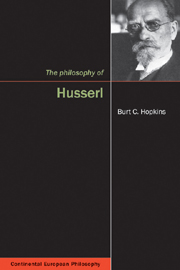Book contents
- Frontmatter
- Contents
- Acknowledgements
- Abbreviations
- Prolegomenon: Husserl's turn to history and pure phenomenology
- I Plato's and Aristotle's theory of eidē
- II From descriptive psychology to transcendentally pure phenomenology
- 4 Origin of the task of pure phenomenology
- 5 Pure phenomenology and Platonism
- 6 Pure phenomenology as the transcendental-phenomenological investigation of absolute consciousness
- 7 Transcendental phenomenology of absolute consciousness and phenomenological philosophy
- 8 Limits of the transcendental-phenomenological investigation of pure consciousness
- III From the phenomenology of transcendental consciousness to that of monadological intersubjectivity
- IV From monadological intersubjectivity to the historical a priori constitutive of all meaning
- V The unwarranted historical presuppositions guiding the fundamental ontological and deconstructive criticisms of transcendental philosophy
- Epilogue: Transcendental-phenomenological criticism of the criticism of phenomenological cognition
- Coda: Phenomenological self-responsibility and the singularity of transcendental philosophy
- Notes
- Bibliography
- Index
6 - Pure phenomenology as the transcendental-phenomenological investigation of absolute consciousness
from II - From descriptive psychology to transcendentally pure phenomenology
- Frontmatter
- Contents
- Acknowledgements
- Abbreviations
- Prolegomenon: Husserl's turn to history and pure phenomenology
- I Plato's and Aristotle's theory of eidē
- II From descriptive psychology to transcendentally pure phenomenology
- 4 Origin of the task of pure phenomenology
- 5 Pure phenomenology and Platonism
- 6 Pure phenomenology as the transcendental-phenomenological investigation of absolute consciousness
- 7 Transcendental phenomenology of absolute consciousness and phenomenological philosophy
- 8 Limits of the transcendental-phenomenological investigation of pure consciousness
- III From the phenomenology of transcendental consciousness to that of monadological intersubjectivity
- IV From monadological intersubjectivity to the historical a priori constitutive of all meaning
- V The unwarranted historical presuppositions guiding the fundamental ontological and deconstructive criticisms of transcendental philosophy
- Epilogue: Transcendental-phenomenological criticism of the criticism of phenomenological cognition
- Coda: Phenomenological self-responsibility and the singularity of transcendental philosophy
- Notes
- Bibliography
- Index
Summary
The transcendental-phenomenological reduction
The ambiguity of the status of the intentional object, as both the immanent content of the act of intentionality and as this act's extra psychic and therefore transcendent referent, is resolved in one bold stroke with Husserl's formulation of the phenomenological reduction. The reduction accomplishes this by radicalizing pure phenomenology's methodical commitment to presuppositionlessness, a commitment that, as we have seen, is realized by the restriction of phenomenological description to that which appears as the reflected and therefore immanent content of phenomenological reflection. The phenomenologically reductive radicalization of pure phenomenology's methodical commitment and reflective character has three reciprocally founded moments: the “bracketing” of the “index of existence” of that which appears to phenomenological reflection, the suspension or “epochē” of the belief in this existence, and the “reduction” proper that follows from these first two moments, in which the reflected phenomenon is presented to phenomenological reflection with the effective “neutralization” of the distinction between its “immanent” and “transcendent” objectivity.
Husserl's notion of “bracketing” is borrowed from symbolic mathematics, where enclosing a mathematical expression in brackets indicates its operational precedence over the expressions surrounding it. His notion of “existential index” refers to the “taken-for-granted” status of the “existence” (as either a transcendent or immanent object) of the reflected content as it is initially given to phenomenological reflection. In the case of the bracketing of the existential index of the reflected content, Husserl characterizes the “operational precedence” as one of “putting out of play” the question of this content's existential status, that is, the question of whether it is really transcendent to experience or not.
- Type
- Chapter
- Information
- The Philosophy of Husserl , pp. 110 - 124Publisher: Acumen PublishingPrint publication year: 2010

